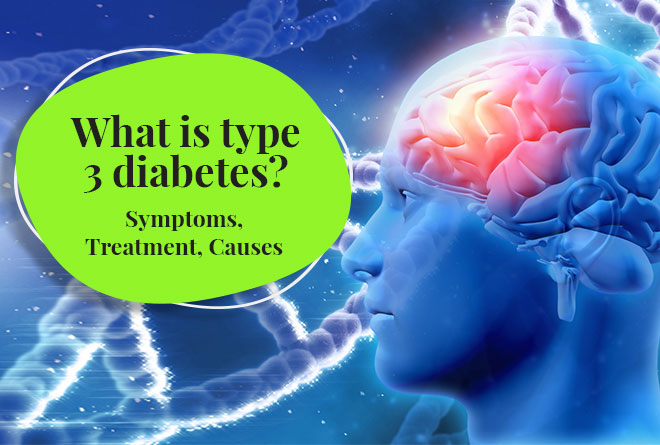
Type 3 diabetes is a complex and often misunderstood condition. It is not as commonly discussed as Type 1 or Type 2 diabetes, but it has significant implications for those affected by it. This blog will provide a comprehensive overview of Type 3 diabetes, including its symptoms, causes, and effective diet plans to help manage this condition.
Type 2 diabetes mellitus (DM) and dementia are two diseases that are quite common nowadays and are likely linked. As a result, the name type 3 diabetes was coined to attempt to integrate the possible pathogenetic processes common by DM and Alzheimer’s disease (AD). In the last decade, substantial epidemiological evidence linking diabetes and dementia has emerged.
Diabetes is linked to a higher risk of dementia in tnd when diabetes is detected early on in life.
Although the impact is less in older groups, diabetes remains a risk factor even in those over 85.
Hyperinsulinemia and insulin resistance are considered health risks for Alzheimer’s disease because they can cause neuron death and enhance the production of extracellular -amyloid deposits.
1-3 Excess-Amyloid can eliminate amyloid in normal circumstances by the lipoprotein receptor-related protein 1 (which lowers if insulin resistance is present) or by a breakdown process involving the insulin-degrading enzyme (IDE).
Insulin will reduce insulin transfer through the blood-brain barrier if persistent peripheral hyperinsulinemia persists.
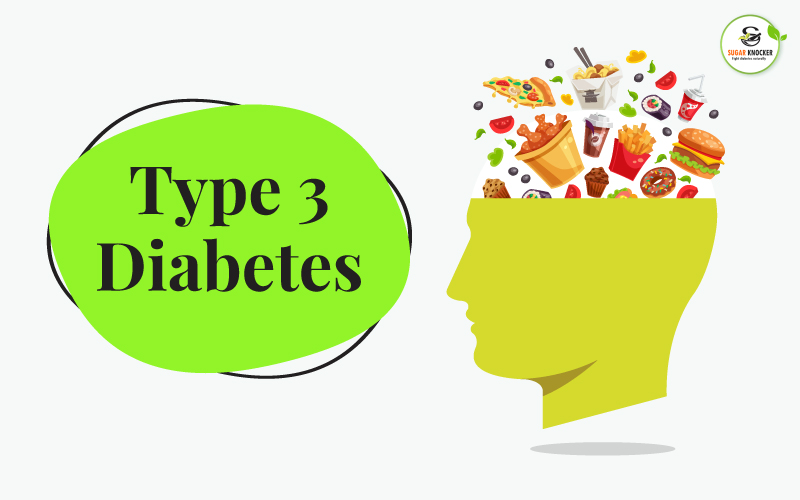
Diabetes mellitus (commonly known as DM or diabetes) is a disorder in which your body has trouble transforming sugar into energy.
Classification of Diabetes Mellitus
Diabetes mellitus is classified into several types, each with its unique characteristics and causes.
Type 1 and Type 2 Diabetes
Type- 1 diabetes is an autoimmune condition where the body attacks insulin-producing cells.
Type -2 diabetes is more common and often related to lifestyle factors such as diet and exercise.
Type 3 and Type 3c Diabetes
Type 3 diabetes is associated with Alzheimer’s disease, while Type 3c diabetes relates to pancreatic diseases that impair insulin production.
There are three types of diabetes that most people are familiar with
Type 1 diabetes (T1DM) is a long-term health issue. This is your pancreas’ endocrine system fails to produce sufficient insulin, causing your blood glucose levels to rise excessively.
Type 2 diabetes (T2DM) is a long-term disorder. Your body accumulates insulin resistance, and your blood sugar levels rise too high.
Gestational diabetes (GDM) develops during pregnancy when blood sugar levels are abnormally high.
According to several studies, Alzheimer’s disease categorizes as a form of diabetes known as type 3 diabetes.
This “type 3 diabetes” is a phrase coined to reflect the theory that Alzheimer’s disease, a leading cause of dementia, is caused by insulin resistance and insulin-like growth factor malfunction that happens only in the brain.
Some people have used this term to refer to people who have type 2 diabetes and identify themselves with Alzheimer’s disease dementia.
The diagnosis of type 3 diabetes is contentious. It is not universally acknowledged as a clinical diagnosis by the medical profession.
The health condition referred to above as “type 3 diabetes” don’t mistake it with type 3c diabetes mellitus.
The pancreas contains both endocrine and exocrine glands, each with its function.
Insulin is a hormone produced and secreted by beta-islet cells in the endocrine pancreas tissue known as the Islets of Langerhans.
T3cDM occurs when the exocrine pancreas gets sick and subsequently produces secondary damage to the endocrine pancreas, resulting in DM. Pathologies of the exocrine pancreas that can lead to T3cDM include:
- Exocrine pancreatic malignancy
- Chronic pancreatitis
- Cystic fibrosis
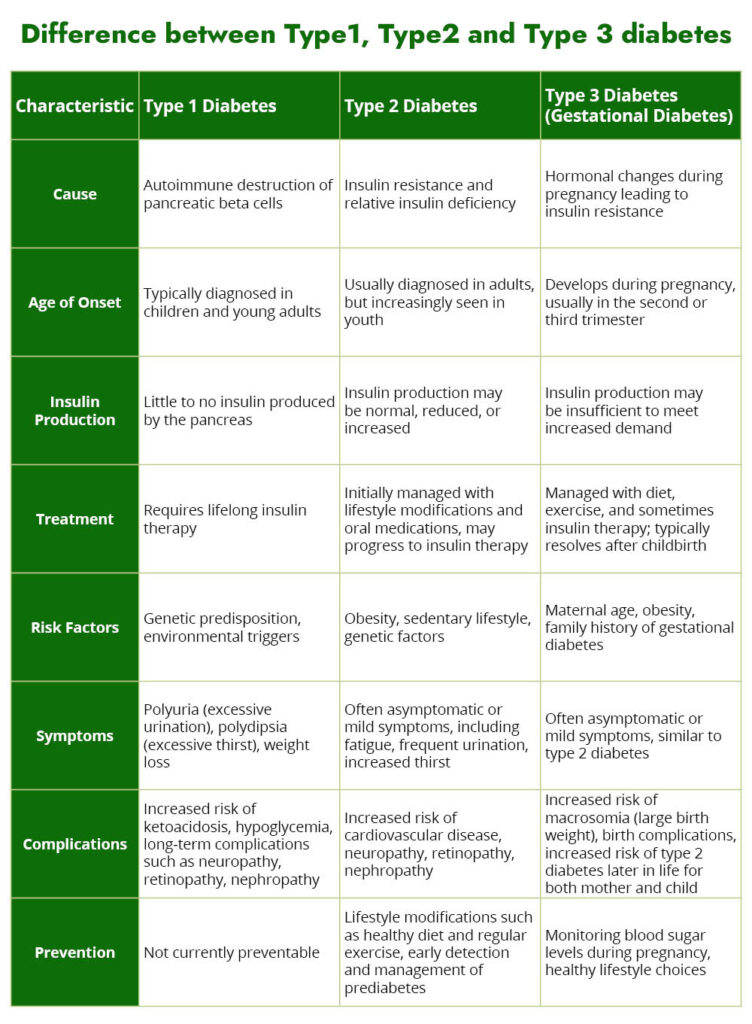
The Link Between Diabetes and Alzheimer’s disease
According to the Mayo Clinic, Alzheimer’s disease and type 2 diabetes have already been connected.
The progression of Alzheimer’s disease has been associated with insulin resistance inside the brain. Alzheimer’s disease is also known as “brain diabetes.” This claim is supported by science, although it is oversimplified..
Diabetes, if remains unaddressed, can lead to severe complications, including those in your brain, over time.
Many patients with type 2 diabetes are unaware that they have the disease, which can cause delays in assessment and treatment.
As a result, people with type 2 diabetes, particularly undiagnosed diabetes, are more likely to suffer from this type of damage.
Diabetes can lead to chemical imbalances in the brain, which can lead to Alzheimer’s disease. High blood glucose levels can also cause inflammation, which can harm brain cells.
Diabetes is recognized as a risk factor for vascular dementia because of these factors.
Vascular dementia can be a discrete diagnosis with its own set of symptoms, or it can be a precursor to an Alzheimer’s disease comorbidity.
This process’ science is debatable. For the time being, it’s been shown that some cases of Alzheimer’s disease and other forms of dementia do not appear to be linked to insulin resistance.
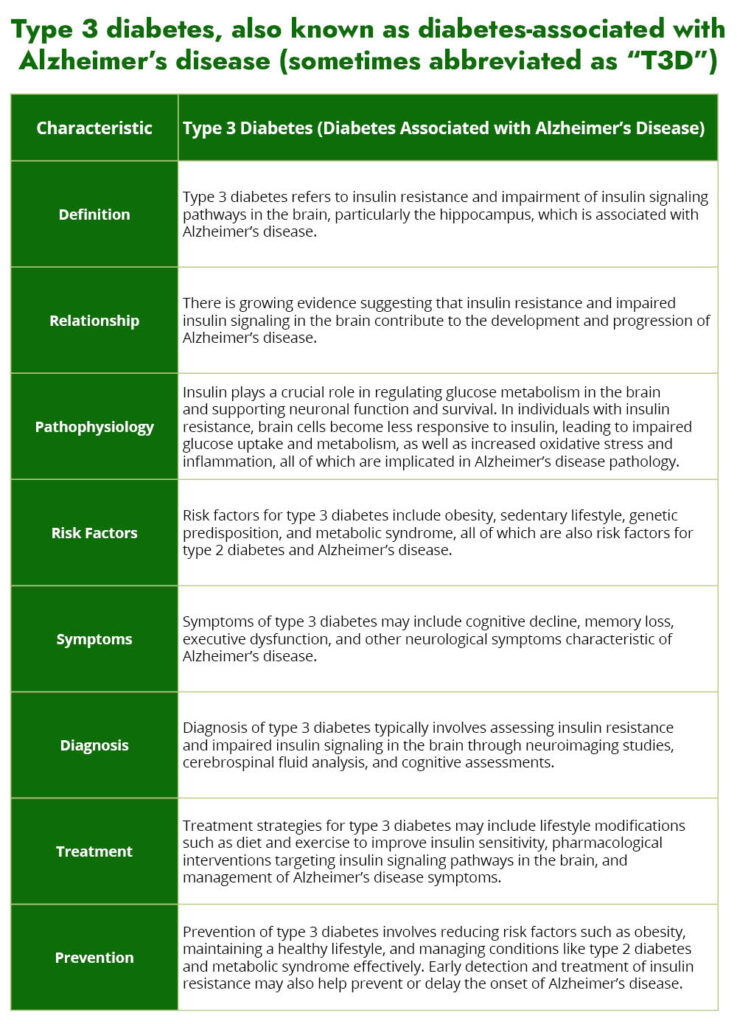
Causes and risk factors of type 3 diabetes

According to a 2016 study, People with type 2 diabetes are up to 60% more likely to acquire Alzheimer’s disease or some other form of dementia, such as vascular dementia.
More than 100,000 adults with dementia took part in this study. Women with type 2 diabetes had a higher risk of acquiring vascular dementia than males, according to the study.
The following are some of the risk factors for type 2 diabetes:
- A history of diabetes in the family
- Hypertension (high blood pressure)
- Being obese or overweight
- Anxiety and polycystic ovary syndrome, among other chronic health issues (PCOS)
Symptoms of type 3 Diabetes

Early Warning Signs
Identifying early symptoms of Type 3 diabetes can be challenging but crucial for timely intervention.
Cognitive Decline
Early symptoms often include mild cognitive decline, such as difficulty remembering recent events or conversations.
Memory Loss
Progressive memory loss is a significant symptom, indicating the deteriorating effect of diabetes on brain function.
Advanced Symptoms
As Type 3 diabetes progresses, symptoms become more pronounced and severe.
Dementia Type 3 Diabetes
The condition can lead to dementia, characterized by severe cognitive impairment and the inability to perform daily activities.
Diagnosis of type 3 diabetes
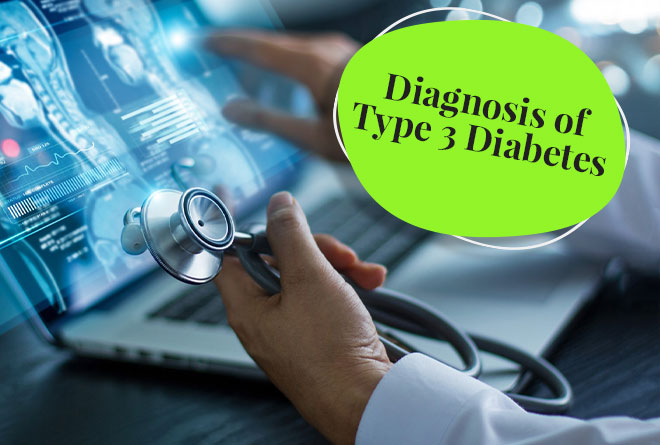
Type 3 diabetes does not have a specific test. Alzheimer’s disease is diagnosed using the following criteria:
- a neurological evaluation
- a medical history
- neurophysiological screening
Several inquiries about your family history and symptoms will be asked by your healthcare practitioner.
Imaging investigations of the head, such as MRI and CT scans, can provide your doctor a glimpse of how your brain is performing.
Cerebrospinal fluid tests can also be used to look for signs of Alzheimer’s disease.
If you have symptoms of type 2 diabetes and Alzheimer’s but haven’t been confirmed with either, your healthcare provider may perform a fasting blood glucose test and a glycated hemoglobin test.
If you have type 2 diabetes, it’s critical that you start treatment right away.
Type 2 diabetes treatment may reduce damage to your body, including your brain, and may decrease the progression of Alzheimer’s disease.
Medical Tests
Diagnosis typically involves a combination of tests to assess both diabetes and cognitive function.
Blood Glucose Levels
Regular monitoring of blood glucose levels is essential for managing diabetes.
Cognitive Assessments
Cognitive tests help evaluate the extent of memory loss and other cognitive impairments.
Clinical Criteria
A formal diagnosis requires meeting specific clinical criteria, including symptoms and test results.
Treatment for Type 3 Diabetes

People with the following conditions have different treatment options:
Alzheimer’s
Adjustments in your lifestyle, such as changing your food and incorporating exercise into your daily routine, can be an important element of your treatment.
Here are some more therapy suggestions:
As per Mayo Clinic, if you’re obese, you should strive to shed 5 to 7% of your body mass. This may help prevent the development of pre-DM2 to DM2 by preventing organ damage caused by high blood sugar levels.
- A low-fat, high-fiber diet rich in fruits and veggies can help alleviate problems.
- Quitting smoking is advised if you smoke since it can help you to manage your health.
- If you have type 2 diabetes with Alzheimer’s disease, controlling your blood sugar is essential for slowing dementia development.
- Anti-diabetes medications metformin and insulin, according to a 2014 study, may reduce the risk of diabetes-related brain damage.
- Prescription medications are available for the treatment of Alzheimer’s dementia cognitive symptoms, but it’s uncertain if they have a major impact on the disease’s symptoms.
- Acetylcholinesterase inhibitors like donepezil, galantamine, and rivastigmine can improve the way your body’s cells communicate.
Memantine (Namenda), an NMDA-receptor antagonist, may also help to reduce symptoms and postpone the onset of Alzheimer’s disease.
Mood changes and sorrow are two signs of Alzheimer’s disease and other dementia types that may be treated with psychotropic medications. \
Antidepressants and anti-anxiety medications may be prescribed in some cases.
Some people may require a low-dose antipsychotic medication later on in the dementia progression.
The future of type 3 diabetes
When Alzheimer’s disease is accompanied by insulin resistance in the brain, it is known as type 3 diabetes.
As a consequence, your prognosis will vary based on a variety of factors, including your diabetes medication and the severity of your dementia.
Researchers that advocate for type 3 diabetes diagnosis claim that if you can treat your diabetes properly with food, exercise, and medication, you may be able to delay the onset of Alzheimer’s albeit the evidence mixed.
Your prognosis will also determined by how promptly you discovered and how your doctor views your specific scenario.
The sooner you begin therapy, the more likely you are to have a great outcome.
From the moment Alzheimer’s disease it found in patient is believed that person has a life expectancy of 3 to 11 years.
After being diagnosed with Alzheimer’s disease person might live for up to 20 years.
How to prevent Type 3 diabetes

There are strategies to better treat type 2 diabetes and reduce your chance of acquiring type 3 diabetes if you currently have it.
Here are a few tried-and-true strategies for treating type 2 diabetes and preventing organ damage:
- Try exercising for 30 minutes four times a week and eat healthy meals that are low in saturated fat, high in protein, and high in fiber.
- Check your blood sugar levels as directed by your healthcare provider.
- Take prescription drugs on time and as directed.
- Maintain your cholesterol levels.
- Keep healthy body weight.
Type 3 diabetes (Alzheimer’s disease) has no known cure.
There are, however, a variety of therapy alternatives that can help to minimize the intensity of symptoms and extend a person’s life.
Even though this varies from person to person, some persons with Alzheimer’s disease do not display symptoms for years.
The majority of Alzheimer’s patients eventually die from a cause other than the illness. Alzheimer’s disease, on the other hand, can create neurological difficulties, which can lead to:
a person breathing food into their lungs, possibly resulting in chest infection, trouble eating, and/or a loss of appetite.
In the last stages of Alzheimer’s disease, individuals may require palliative care to enhance their quality of life.
Insulin resistance in the brain, according to scientists, can cause amyloid plaques, oxidative stress, and inflammation, which are all hallmarks of Alzheimer’s disease.
While further research is needed, investigations indicate that certain factors appear to raise the risk of Alzheimer’s disease. Obesity, a lack of physical activity, and high blood pressure are all examples.
Diet and lifestyle adjustments can help people manage their weight and blood glucose, which may help them avoid cognitive deterioration.
Managing Type 3 Diabetes
Diet Plans
A well-balanced diet is crucial in managing Type 3 diabetes and its symptoms.
Type 3 Diabetes Diet Plan
A diet rich in vegetables, fruits, lean proteins, and whole grains can help manage blood glucose levels and support brain health.
Nutritional Guidelines
Specific guidelines recommend reducing sugar and saturated fat intake while increasing fiber and omega-3 fatty acids.
Lifestyle Modifications
Lifestyle changes are essential in managing Type 3 diabetes effectively.
Exercise Recommendations
Regular physical activity can help maintain a healthy weight and improve insulin sensitivity.
Stress Management
Stress management techniques such as meditation, yoga, and regular sleep patterns can support overall health.
Life Expectancy and Living with Type 3 Diabetes
Prognosis
The prognosis of Type 3 diabetes can vary depending on the severity and management of the condition.
Type 3c Diabetes Life Expectancy
Life expectancy can be affected by the overall management of diabetes and associated conditions.
Quality of Life Considerations
Maintaining a good quality of life involves managing symptoms and preventing complications through a healthy lifestyle and regular medical check-ups.
Support and Resources
Access to support and resources is vital for those living with Type 3 diabetes.
Medical Support
Regular consultations with healthcare providers are essential for effective management.
Conclusion
Understanding Type 3 diabetes, its symptoms, causes, and management strategies is crucial for those affected by this condition. By following a healthy lifestyle, managing stress, and seeking regular medical advice, individuals can manage their symptoms and improve their quality of life. This comprehensive guide aims to provide valuable insights and practical tips for dealing with Type 3 diabetes effectively.
Answers to Frequently Asked Question on Type 3 Diabetes
What is type of 3 diabetes?
Type 3 diabetes is a term used to describe the correlation between diabetes and Alzheimer’s disease. It represents a form of diabetes that exhibits characteristics of both types but primarily affects cognitive function.
Can Type 3 diabetes be cured?
Alzheimer’s disease, or type 3 diabetes, has no known treatment. However, a person’s life may be prolonged and the intensity of their symptoms may be lessened by several treatments.
How is type 3 diabetes diagnosed?
There is no specific test for type 3 diabetes. Alzheimer’s disease is diagnosed based on: a neurological examination, medical history, and neurophysiological testing. Your primary care provider will ask several questions about your family history and your symptoms.
How do you control type 3 diabetes?
People with the condition typically take an oral diabetes medication (such as metformin) and/or take synthetic insulin (with injections or an insulin pump). Your treatment needs may change over time if your pancreas becomes more damaged. For example, an oral medication may work well to manage your blood sugar at first.
Why is Alzheimer’s called type 3 diabetes?
Recently researchers proposed the term ‘Type-3-Diabetes’ for Alzheimer’s disease (AD) because of the shared molecular and cellular features among Type-1-Diabetes, Type-2-Diabetes and insulin resistance associated with memory deficits and cognitive decline in elderly individuals.
Conclusion
In conclusion, Type 3 diabetes, also known as Alzheimer’s disease, presents a complex interplay between insulin resistance, brain function, and neurodegeneration. While the exact causes remain elusive, emerging research suggests that metabolic dysregulation, genetic predisposition, and lifestyle factors contribute significantly to its development. Recognizing the symptoms early, such as cognitive decline and memory impairment, is crucial for timely intervention. Current treatment approaches focus on managing blood sugar levels, promoting neuroprotective strategies, and adopting a healthy lifestyle. However, further research is imperative to unravel the intricate mechanisms underlying Type 3 diabetes and to develop more effective preventive measures and treatments.

